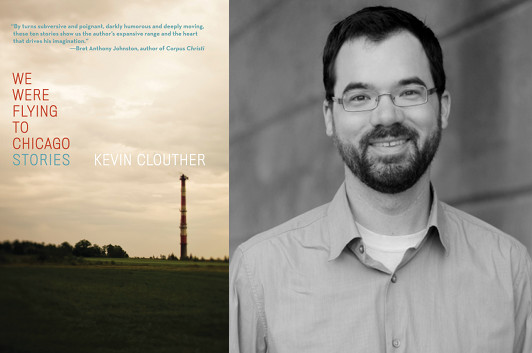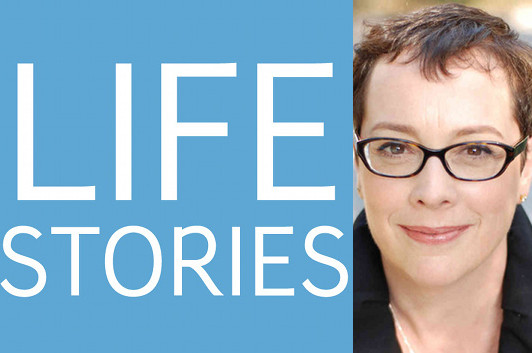Kevin Clouther & the Vision of Chekhov

photo via Black Balloon Publishing
I’ve been dipping in and out of the stories in Kevin Clouther’s debut collection, We Were Flying to Chicago, over this long weekend, and they’re fantastic. In the title story, Clouther takes on the collective consciousness of a group of airplane passengers, from the long stretch of time they’re stuck on the runway waiting to take off to the moment they finally reach Chicago—not their final destination, but they’ll be stuck there, too. It’s a portrait of boredom and frustration that escapes both in its own telling, approaching a kind of abstraction even in its particular details. In this guest essay, Clouther considers Anton Chekhov’s own eye for detail, and the vividness of his stories.
I rarely think about Anton Chekhov’s stories while I’m writing, though I often think about them as I’m living, which ought to be higher praise. There is a celebration of existence in his stories that is more than earnest or unembarrassed—it’s triumphant, as if the writer is grabbing the reader by both arms and insisting this person lift his or her grubby head to look, if only for a moment, at the world as it actually presents itself. Here is Chekhov (translated beautifully, as always, by Pevear and Volokhonsky) in “The Man in a Case”:
It was already midnight. To the right the whole village was visible, the long street stretching into the distance a good three miles. Everything was sunk in a hushed, deep sleep; not a movement, not a sound, it was hard to believe that nature could be so hushed. When you see a wide village street on a moonlit night, with its cottage, haystacks, sleeping willows, your own soul becomes hushed; in that peace, hiding from toil, care, and grief in the shadows of the night, it turns meek, mournful, beautiful, and it seems that the stars, too, look down on it tenderly and with feeling, and there is no more evil on earth, and all is well.
I forgot that I ever looked at a street like this until Chekhov reminded me: I love when writers do that. The transition from the third person to the second is a gesture I would be reluctant to make, but Chekhov does it so readily, and with such confidence, that I trust there is something universal here. The last endless sentence does so many things I wouldn’t dare, like the accumulation of abstract adjectives—”meek, mournful, beautiful”—and frank consideration of “evil on earth.” He doesn’t shy from discussing the soul. Committing the pathetic fallacy doesn’t bother him, either.
It all reminds me of the last four lines of “Composed upon Westminster Bridge, September 3, 1802,” a gem from the other end of the same century (would Chekhov have read Wordsworth?):
Ne’er saw I, never felt, a calm so deep!
The river glideth at his own sweet will:
Dear God! the very houses seem asleep;
And all that mighty heart is lying still!
26 May 2014 | selling shorts |
Life Stories #70: Julia Angwin
Subscribe to Life Stories in iTunes
Most of the time, Life Stories features interviews with memoir writers about their lives and the art of writing memoir, but this episode with Julia Angwin is slightly different. Her book, Dragnet Nation, isn’t a memoir exactly—more a combination of reportage and personal experience, as Angwin discusses how much of our day-to-day online activity can be seen by other people, including governments and corporations, and what she did to erase as much of her digital footprint as she could. Naturally, Edward Snowden’s revelations about the NSA entered into our discussion:
“When Snowden came out, more than anything, it was really reassuring to me. Because all the things that he proved—the Verizon phone database, the PRISM program—were things that were basically known but not known, if that makes sense. So people who follow these issues… there had been enough hints and leaks and tips that these were going on that we all believed it was going on, but we felt like we were completely paranoid and crazy. So when he came with this, I thought, ‘Oh, thank God I’m not crazy, right? This is actually happening.’ So it was really helpful for me, for the book, because I had already chosen my topic… but, boy, did he reveal a lot more dragnets that we didn’t know about before.”
Listen to Life Stories #70: Julia Angwin (MP3 file); or download this file by right-clicking (Mac users, option-click). Or subscribe to Life Stories in iTunes, where you can catch up with earlier episodes and be alerted whenever a new one is released. (And if you are an iTunes subscriber, please consider rating and reviewing the podcast!)
25 May 2014 | life stories |


 Our Endless and Proper Work is my new book with Belt Publishing about starting (and sticking to) a productive writing practice.
Our Endless and Proper Work is my new book with Belt Publishing about starting (and sticking to) a productive writing practice. 
